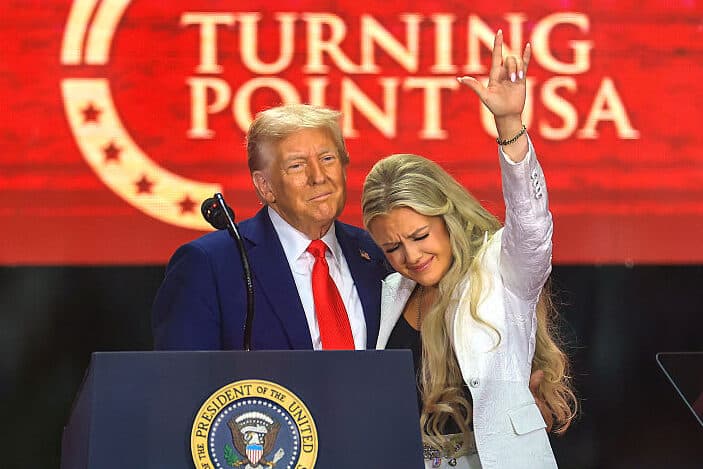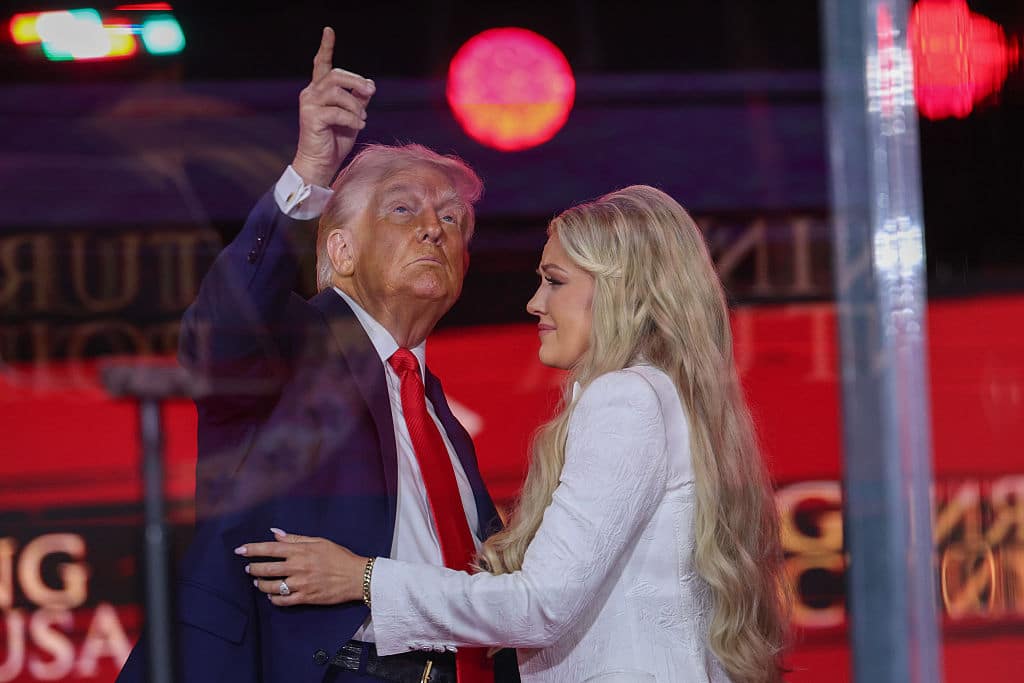Nearly 100,000 people poured into State Farm Stadium in Glendale, Arizona, on Sunday, a red-white-and-blue sea of baseball caps, handmade signs, and tear-streaked faces. Eleven days had passed since Charlie Kirk, 31, was fatally shot in the neck while speaking at Utah Valley University. The shock still hung in the air. You could feel it in the murmurs that rippled through the concourse, in the long silences between songs from the stage band, in the way strangers hugged like old friends.
When Erika Kirk stepped to the lectern, the cavernous NFL arena went quiet enough to hear the buzz of the lights. She took a breath, steadied herself, and began—voice soft, then gathering strength, then breaking and rebuilding, over and over. What followed was not a political speech so much as a public act of love and of faith. She described the husband she met, the mission that defined him, and the moment she realized the next chapter would be hers to carry.
The line that stopped the room landed early. “My husband, he wanted to save young men, just like the one who took his life,” she said, eyes glistening as the jumbo screens magnified every micro-expression to the rafters. “That man, that young man, I forgive him. I forgive him because it was what Christ did, and it is what Charlie would do.” Around the bowl, people clasped hands. Some closed their eyes. A few audibly said “amen.”

She returned to that theme repeatedly: that the answer to violence was not more violence, that the answer to hate was not reciprocal hate. “The answer we know from the gospel is love and always love—love for our enemies and love for those who persecute us.” Her cadence was deliberate, like she wanted the words to sink through the concrete and stay there.
Erika also shared the moment no spouse ever imagines having to narrate. In a hushed voice she described seeing Charlie’s body at the hospital. “I saw the wound that ended his life,” she said. “I felt everything he would expect to feel. I felt shock. I felt horror, and a level of heartache that I didn’t even know existed.” She paused, swallowed, and added something that seemed to lift a collective weight: “But there was something else, too. Even in death, I could see the man that I love… I also saw on his lips the faintest smile.” Doctors had told her death was instantaneous. “There was no pain, there was no fear, no agony,” she said. “One moment, Charlie was doing what he loved… then he blinked. He blinked and saw his savior in paradise.”
If forgiveness was the headline, resolve was the subtext. Erika made clear she intends to shoulder the work Charlie left behind. She promised to lead Turning Point USA forward—“to pick up the torch” as she put it—insisting that mission would not be buried with him. Those who came expecting a eulogy left hearing a succession plan: a young widow saying out loud she would carry on, and asking the tens of thousands present to help her do it.
When Donald Trump took the stage as the keynote speaker, the stadium shifted from mournful to electric. He praised Kirk as “a martyr now for America’s freedom” and called him “a great of his generation.” In a rare aside, he allowed that the two men did not always agree. “He did not hate his opponents, he wanted the best for them,” Trump said. “That’s where I disagree with Charlie. I hate my opponents and I don’t want what’s best for them.” The line drew a mix of laughter and uneasy murmurs; even here, in a memorial, politics was never far from the surface.
Trump’s remarks ended not with a crescendo but with an embrace. He turned toward Erika, pulled her close, and held on as the crowd rose to its feet. On the screens, the former president’s face was unreadable for a beat—tenderness to some, awkwardness to others—and the moment instantly became internet fodder. Clips ricocheted across TikTok within hours. “We can all read the thoughts going through his mind right? Like it’s not just me?… what is this timeline?” one user, @literally_lyd, captioned a slow-motion replay. “I was crawling out of my skin about how weird it was,” another commenter wrote. “It’s my fault for having eyes,” someone else joked. “Omg!!! There are things I never needed to see,” added another. The debate spun into darker sarcasm for some—one viral quip alluded to Trump’s infamous 2005 hot-mic remark—but others pushed back, pointing out that grief sometimes looks clumsy up close. “It looks like he is comforting a grieving young widow to me, nothing else,” one person wrote. “The girl is overwhelmed by grief. He is being kind.”

That online back-and-forth underscored what the day itself kept revealing: even at a memorial, people were watching for symbols and reading meaning into small gestures. The flags draped over seats, the hush that fell when prayer began, the extended handshakes between political adversaries in the front rows, the way Erika’s voice steadied whenever she spoke about faith. Each detail felt loaded. Each one told a story depending on who was doing the telling.
For those inside the stadium, though, the atmosphere was less about posts and more about presence. There were families who had driven through the night from neighboring states, young volunteers in matching T-shirts guiding elderly supporters to their seats, and veterans standing stiffly at attention during the anthem. Between speeches, the giant screens played montages of Kirk on campus stages and in television studios, intercut with candid shots of him with his wife and children—backyard sprinkler runs, roadside milkshakes, a toddler asleep on his chest. The juxtaposition was jarring and effective: the public firebrand and the private father collapsed into one narrative of a life abruptly cut short.
Security was tight—an unavoidable reality in the aftermath of a political assassination. Secret Service-style details flanked the stage, and the VIP suite where Trump later watched portions of the program was visibly protected. It was another reminder of the violent act that had made this gathering necessary in the first place. Prosecutors have charged 22-year-old Tyler Robinson with multiple felonies, including aggravated murder, an offense that could carry the death penalty if pursued and proved.
As the afternoon stretched on, and the sun began to slant through the high stadium windows, Erika returned to the microphone one last time. She thanked first responders and doctors. She thanked those who prayed from afar. She thanked those who would keep praying when the cameras left and the casseroles stopped arriving. Then she closed where she began—on forgiveness and on calling. “Charlie died with incomplete work,” she said, “but not with unfinished business.” The distinction hung in the air. The crowd stood and stayed standing, many with hands lifted, as the final song swelled.
Outside afterward, people lingered in the parking lots, reluctant to turn the key and let the day end. Some swapped memories. Some simply stood in silence looking back at the stadium. If you listened closely, you could hear bits of Erika’s words repeated in small circles: love, not hate. Blink and see paradise. Pick up the torch. In a week defined by outrage and argument, the widow had given tens of thousands of people something else to hold on to—and, for at least a moment, almost an entire stadium held its breath together.
